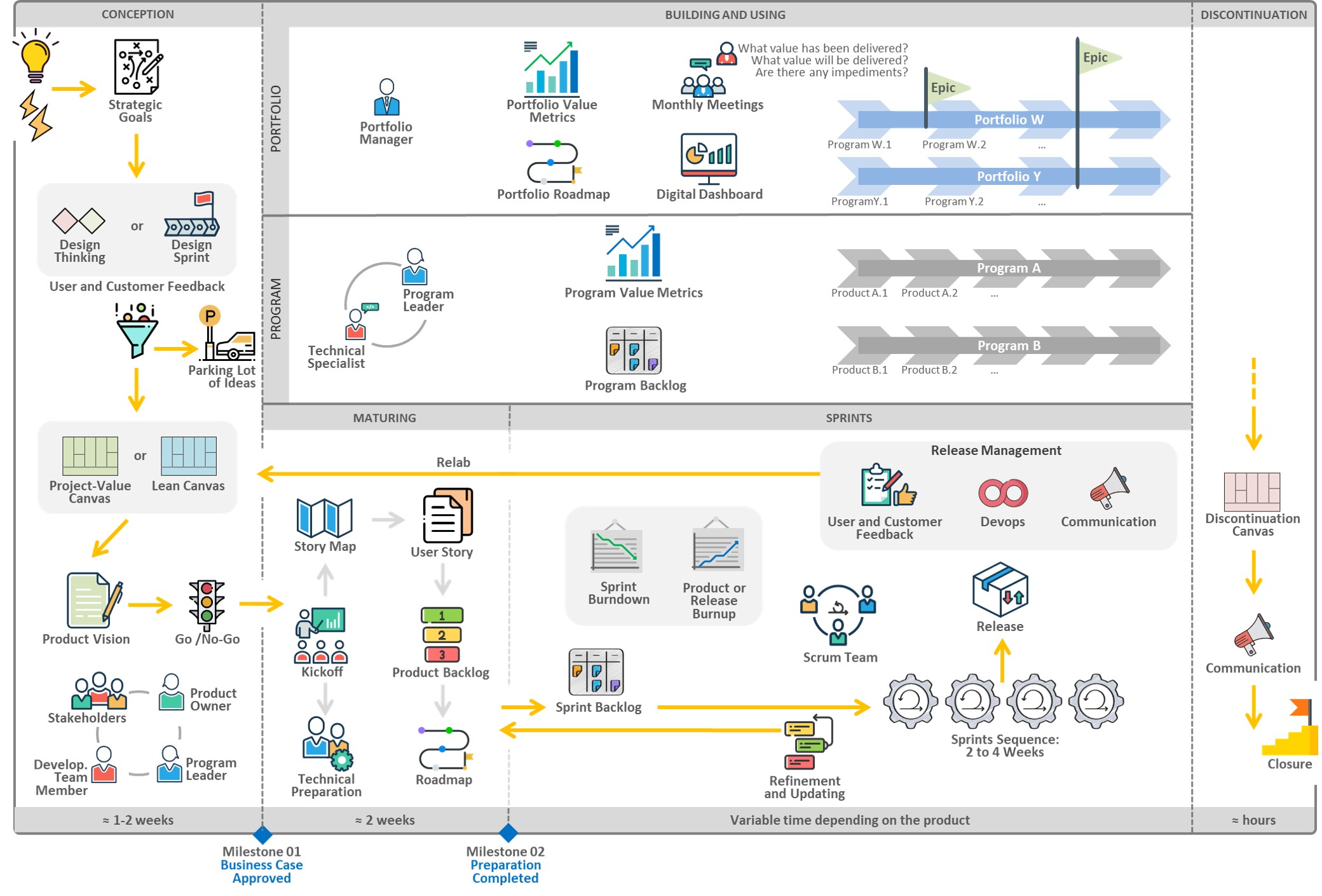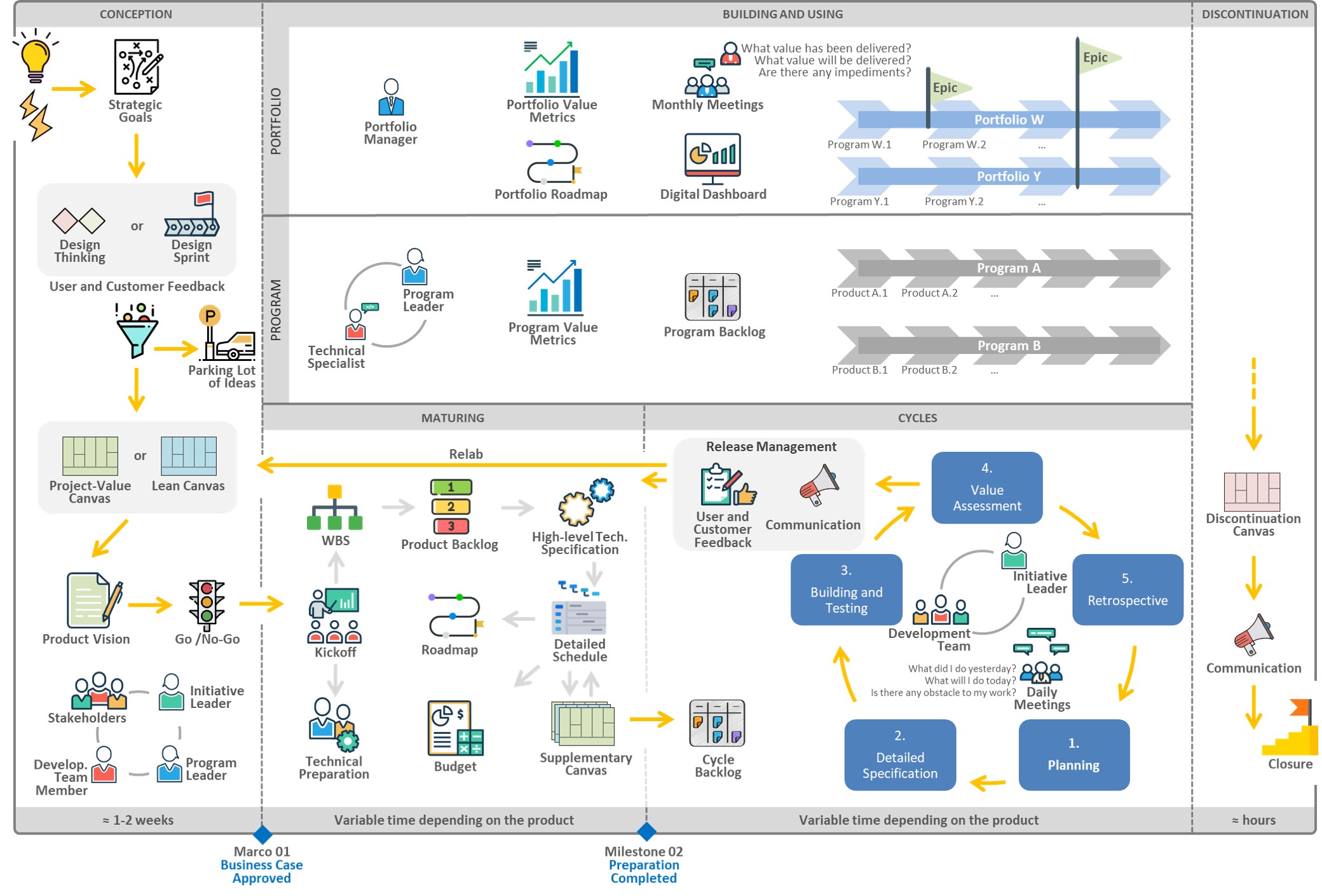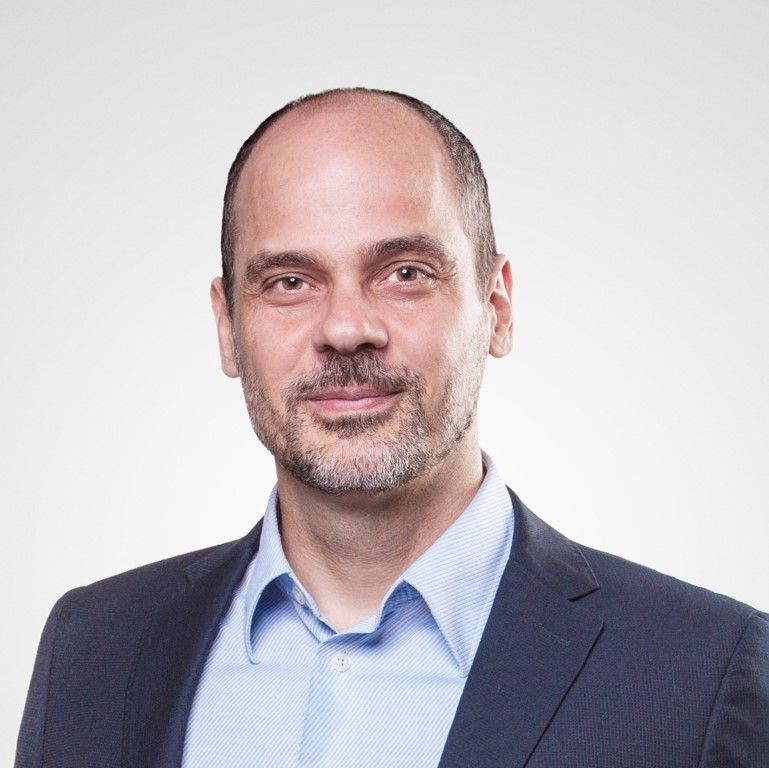“PIM-Go© is a model that connects good practices and simplifies the creation of valuable product delivery”.
What is PIM-Go©?
The Product Integration Model is a set of models and artifacts for the development of products based on cutting-edge practices in product and project management.
PIM-Go© is currently comprised of PIM-Go Agile, for products in highly changing environments, and PIM-Go Hybrid, for more predictive contexts.
Why use PIM-Go©?
PIM-Go© was built based on the practical experience of its authors, who are professionals in project and product management, with the purpose of:
- Consolidating in a single flow the good practices scattered over different sources (e.g., Design Thinking, Design Sprint, Scrum, etc.);
- Creating an end-to-end model, i.e., a model that guides practice from the idea’s conception to its delivery;
- Making its use simple and quick by means of templates, canvas and artifacts that can be rapidly deployed by practitioners;
- Enabling its use not only for agile products, but also for predictive contexts.
The use of PIM-Go© is free, and it is publically available at this website. However, its content is protected by international copyright law, which includes its models, canvas and texts.
What is PIM-Go©?
The Product Integration Model is a set of models and artifacts for the development of products based on cutting-edge practices in product and project management.
PIM-Go© is currently comprised of PIM-Go Agile, for products in highly changing environments, and PIM-Go Hybrid, for more predictive contexts.
Why use PIM-Go©?
PIM-Go© was built based on the practical experience of its authors, who are professionals in project and product management, with the purpose of:
- Consolidating in a single flow the good practices scattered over different sources (e.g., Design Thinking, Design Sprint, Scrum, etc.);
- Creating an end-to-end model, i.e., a model that guides practice from the idea’s conception to its delivery;
- Making its use simple and quick by means of templates, canvas and artifacts that can be rapidly deployed by practitioners;
- Enabling its use not only for agile products, but also for predictive contexts.
The use of PIM-Go© is free, and it is publically available at this website. However, its content is protected by international copyright law, which includes its models, canvas and texts.
PIM-Go© Manifesto of Values
Simplicity
“We believe in practices that are simple, understandable for those who lead or participate in them”.
PIM-Go© seeks to be simple by filtering only what is essential for developing an outstanding product. We encourage that particularities of each organization be incorporated as needed.
Fail Fast
“We believe that failing is inherent in the learning process, but it must be anticipated as much as possible“.
PIM-Go© explicitly includes a conception and maturing step which uses modern techniques of ideation, designing and user validation in order to test hypotheses.
Breadth
“We believe that products have different market characteristics and contexts and should therefore have different approaches“.
PIM-Go© encompasses two models: one for agile products (PIM-Go Agile) and one for products in predictive contexts (PIM-Go Hybrid).
Easy of Use
“We believe that theoretical models should be associated with guidance and artifacts that facilitate adopting them quickly in practice“.
PIM-Go© has templates integrated in the model to facilitate its use in organizations.
PIM-Go© Manifesto of Values
Simplicity
“We believe in practices that are simple, understandable for those who lead or participate in them”.
PIM-Go© seeks to be simple by filtering only what is essential for developing an outstanding product. We encourage that particularities of each organization be incorporated as needed.
Fail Fast
“We believe that failing is inherent in the learning process, but it must be anticipated as much as possible“.
PIM-Go© explicitly includes a conception and maturing step which uses modern techniques of ideation, designing and user validation in order to test hypotheses.
Breadth
“We believe that products have different market characteristics and contexts and should therefore have different approaches“.
PIM-Go© encompasses two models: one for agile products (PIM-Go Agile) and one for products in predictive contexts (PIM-Go Hybrid).
Easy of Use
“We believe that theoretical models should be associated with guidance and artifacts that facilitate adopting them quickly in practice“.
PIM-Go© has templates integrated in the model to facilitate its use in organizations.
About the Authors
Alvaro Junqueira
A professional with 20+ years of experience in IT product and project management in the public and private sectors. Since 2016, he has been an MBA professor in project management.
He holds a master’s degree in Business Management from FGV/SP, has been an exchange student at the University of Calgary (Canada), and has taken a specialization course in Computer and Information Sciences at Auckland University of Technology (New Zealand), an Executive MBA at COPPEAD/UFRJ and a Negotiation and Leadership course at Harvard Law School.
He holds the following certifications: PMP©, CSM©, PSM© and PSPO©.
Igor Lagreca
A tax auditor for the Sefaz/SP and an MBA professor for over 8 years at various courses related to Product, Project and Portfolio Management at FIA, FIAP, FGV, Mackenzie, USP, FAZESP and FEI, having taught 11,000+ students in a total of 7,300+ class hours.
He holds a Ph.D. and a master’s degree in Computer Engineering from the Federal University of Rio Grande do Norte (UFRN) and has taken graduate courses in Public Management at the Federal University of São Paulo (UNIFESP) and IT at the Fundação Instituto de Administração (FIA), all in Brazil.
He holds the following certifications: PSM©, PSPO©, PMI-ACP©, PMP©, PMI-SP©, CAPM©, MCTS 070-178©, ITIL V3© and COBIT 4.1©.
About the Authors
Alvaro Junqueira
A professional with 20+ years of experience in IT product and project management in the public and private sectors. Since 2016, he has been an MBA professor in project management.
He holds a master’s degree in Business Management from FGV/SP, has been an exchange student at the University of Calgary (Canada), and has taken a specialization course in Computer and Information Sciences at Auckland University of Technology (New Zealand), an Executive MBA at COPPEAD/UFRJ and a Negotiation and Leadership course at Harvard Law School.
He holds the following certifications: PMP©, CSM© and PSPO©.
Igor Lagreca
A tax auditor for the Sefaz/SP and an MBA professor for over 8 years at various courses related to Product, Project and Portfolio Management at FIA, FIAP, FGV, Mackenzie, USP, FAZESP and FEI, having taught 11,000+ students in a total of 7,300+ class hours.
He holds a Ph.D. and a master’s degree in Computer Engineering from the Federal University of Rio Grande do Norte (UFRN) and has taken graduate courses in Public Management at the Federal University of São Paulo (UNIFESP) and IT at the Fundação Instituto de Administração (FIA), all in Brazil.
He holds the following certifications: PSM©, PSPO©, PMI-ACP©, PMP©, PMI-SP©, CAPM©, MCTS 070-178©, ITIL V3© and COBIT 4.1©.




